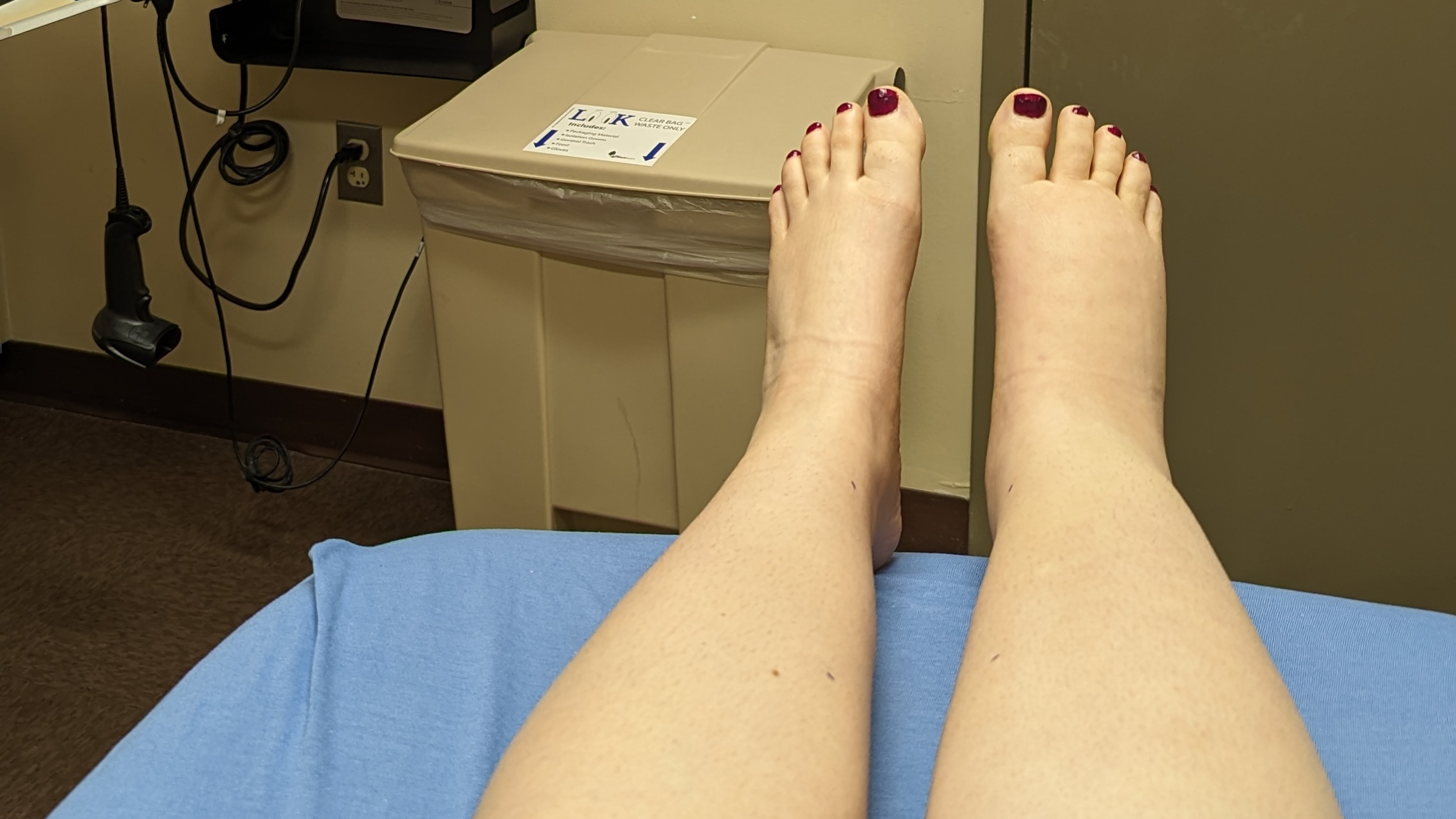There’s always something going on in the world of lymphedema and lymphatic research! It can be a lot to keep up with, so here’s a digest of some of the biggest headlines from the past month carefully curated to keep you in the lymphie loop.
“Study finds cellular processes controlling the formation of lymphatic valves”
New findings from a recent mouse model study suggest that targeting signaling pathways involved in creating and maintaining lymphatic valves may one day be a viable therapy for patients coping with lymphedema.
“We knew that lymph flow was required for the valves to form and function throughout life, but we did not know how the endothelial cells that make up the inner lining of lymphatic vessels can ‘sense’ the flow,” said senior author Joshua Scallan, PhD, assistant professor in the USF Health Department of Molecular Pharmacology and Physiology.
“This study is the first to identify signaling pathways by which cells sense and respond to the mechanics of flow to keep the valves operating effectively — so that lymph fluid keeps moving forward.”
Our first major paper from the lab! VE-cadherin enables lymphatic endothelial cells to respond to lymph flow and make valves! #Lymphatics #VEcadherin https://t.co/fEmCWWcMeJ
— Joshua Scallan (@ScallanLab) September 1, 2019
READ THE FULL ARTICLE FROM UNIVERSITY OF SOUTH FLORIDA.
“New Study Helps to Understand Human Defense Mechanisms and Spread of Cancer”
Researchers of the University of Turku in Finland have gained more detailed information on the diversity of the human lymphatic system than before.
“Our research results open up new perspectives to understanding the defense mechanism on the molecular level,” says postdoctoral researcher Akira Takeda.
“For drug development, the results also offer potential new target molecules to regulate immune defense and prevent the spread of cancer, as several cancers, such as breast cancers and head and neck cancers, spread primarily via the lymphatic system.”
READ THE PRESS RELEASE FROM UNIVERSITY OF TURKU.
“Back in Circulation from Lymphedema”
As awareness of lymphedema and its surgical treatment options grows, so does the need for trained surgeons.
“One of the problems is that lymphology as a specialty is not taught in U.S. medical schools, and lymphedema itself isn’t even talked about as much to medical students,” says Dr. Ketan Patel, surgeon and director of the Center for Advanced Lymphedema Surgery and Treatment at Keck Medicine of USC.
“So many people have learned the procedures in Taiwan, and now there’s a handful of us — 15, maybe 20 surgeons — who do a reasonable volume of this surgery. But we’re teaching others to do it.”
READ THE ARTICLE ALONG WITH A FOLLOW UP ARTICLE AT CURE TODAY.
“No Lymphedema Improvement With Home Interventions”
Results from a recent study contradict previous observational studies suggesting that weight loss may improve breast cancer related-lymphedema (BCRL).
After a year of evaluation, limb volume did not differ significantly between a control group of women who received standard lymphedema care from certified therapists and three different groups assigned to at-home interventions, in addition to the standard care, reported Kathryn H. Schmitz, PhD, of Pennsylvania State College of Medicine in Hershey, and co-authors.
“In short, BCRL has not been eradicated,” the authors stated. “Women with BCRL deserve evidence-based approaches to improve outcomes for this chronic condition.”
Main results from our WISER Survivor Trial out TODAY in JAMA Oncology. Key Findings: 1) Wt loss does NOT improve LE 2) gym based ex better for LE outcomes Home-Based Exercise and Weight Loss Among Overweight Breast Cancer Survivors With Lymphedema https://t.co/lLbkiJ2c76
— Dr Kathryn Schmitz (@fitaftercancer) August 15, 2019
READ THE ARTICLE AT MEDPAGE TODAY.
Lymphatic filariasis news
Lymphatic filariasis (commonly known as elephantiasis) is a neglected tropical disease caused by parasitic infection to the lymphatic system. It is the leading cause of lymphedema worldwide: of the over 120 million people infected, 40 million are incapacitated or disfigured by the disease.
“Elephantiasis victims in Kamwenge, Kitagwenda cry for help”
Residents of the Ugandan districts of Kamwenge and Kitagwenda who have been infected with lymphatic filariasis are calling for help as they struggle to treat themselves:
“The people are suffering and they are not getting treatment,” says Kamwenge Woman MP Dorothy Nshaija.
READ THE ARTICLE AT NEW VISION.
Not much has changed in Kamwenge since this video from 2015. Note: contains some graphic imagery.
“Twenty-four school children infected”
Twenty-four school children in Kathmandu district are infected with lymphatic filariasis.
“We have only one year left [of the mass drug administration program] and people are still suffering from the disease,” says Pradip Rimal, program officer at Lymphatic Filariasis Elimination Programme. The chances of the disease spreading are high.
“The reports reveal that educated people have taken the health problem lightly and haven’t taken drugs against the disease. Mass awareness is necessary,” he said.
READ THE ARTICLE AT THE HIMALAYAN TIMES.
“Elimination of lymphatic filariasis still a challenge”
The Government of India launched the National Programme for Elimination of Lymphatic Filariasis in 2004, implementing the globally-recognized mass drug administration as a preventative against disease transmission.
“Despite these efforts, greater emphasis needs to be placed in employing strategies tackling the source of the disease – preventing mosquitoes to human transmission,” says Dr. N.K. Ganguly, former director general of the Indian Council of Medical Research.
READ THE ARTICLE AT THE HINDU.
“Agony of living with elephantiasis”
Kenyan doctor Nelly Bosire reflects on the plight of those living with lymphatic filariasis in her country:
“The distress the disease causes is unimaginable. The patients cannot work to earn a living, are ostracized in society and are unable to carry out normal activities due to the burden of the enlarged organs.”
READ THE ARTICLE AT DAILY NATION.
Compressed news
- Karen Dannenhauer is recovering from her third and final major surgery to alleviate her lymphedema: “There are so many things I haven’t been able to do that I want to start doing. I’m anxious to see what my legs can do now.” (Daily Journal)
- Lymphedema patient Angela Mimms shares how a fitness program has improved her quality of life: “When I look at what I have to deal with, and see what other women have to deal with … when I hear them say, ‘I can’t do it,’ yes. Yes, you can. If I can do it, anybody can do it.” (The Register-Herald)
- This post-Bachelorette profile on Cameron Ayala spotlights his work with the lymphie kids camp #CampWatchMe: “Growing up with Lymphedema, I never had an opportunity to meet another child who also suffers from this rare disease […] These young #lymphedemawarriors are my inspiration.” (Bustle)
- Why My Insurance Company’s Treatment of My Lymphedema Means I’m Suffering: “My insurance knows I will have lymphedema for the rest of my life. So, why is there this need for a constant check — a constant referral agreeing I am indeed sick and was not cured in the past six weeks? […] I constantly worry that one day, my insurance company will deny my treatments completely.” (Yahoo! Lifestyle)
- A unique physiotherapy program is helping breast cancer patients: “The literature is pretty clear […] The prevention model is effective for decreasing the incidence of lymphedema and decreasing stiffness, weakness and pain after surgery.” (CTV News Vancouver)
- After being denied coverage for liposuction to treat her lipedema, Clodagh traveled to Germany for the surgery: “I need the surgery, this is something which will change my life. It’s not something I want because I don’t like the way I look, it’s something I need to have. For it to be classed as cosmetic surgery is really upsetting.” (Free Radio)
- Lauren Mudie is currently battling binge eating disorder along with mental health issues and lymphedema: “My weight is something I’m working on but I thought why be sad and hate myself in the process […] I felt good about the pictures, wanted to share a couple and encourage others too and to help people boost their own confidence.” (Daily Mirror)
- Jen Matsas shares what it’s like to live with lipedema: “Over the years that pain gradually got worse and worse until it became very intense […] And it didn’t feel like normal joint or muscle pain — it was in my flesh.” (Body and Soul)
- Rachael Boggiano, a musical theatre student at the Italia Conti Academy in London, has lymphedema: “I’ve not given up on my dream but my main concern is that the condition will affect my career.” (Daily Mail)
- Isobel Harris has launched a fundraiser to raise money for lymphedema surgery: “There are so many ways this has affected my life […] my life has been taken away from me. I hate asking for help but I have no other choice.” (The Courier)
- Lipedema patient Lesley Bambridge is raising awareness for invisible disabilities in her community: “I think there are a lot of hidden disabilities and I think it’s really championing those invisible disabilities as well, making more of that and where people can go for help.” (KLFM 96.7)
- Lipedema isn’t rare, but it’s rarely diagnosed, vascular medicine specialist John R. Bartholomew, MD., points out: “Doctors don’t know about lipedema — it’s that simple.” (Cleveland Clinic)
See Dr. Bartholomew’s presentation “Lipedema is not rare, but the Diagnosis is Rarely Made” from the 2019 Fat Disorders Resource Society conference:




Leave a Reply